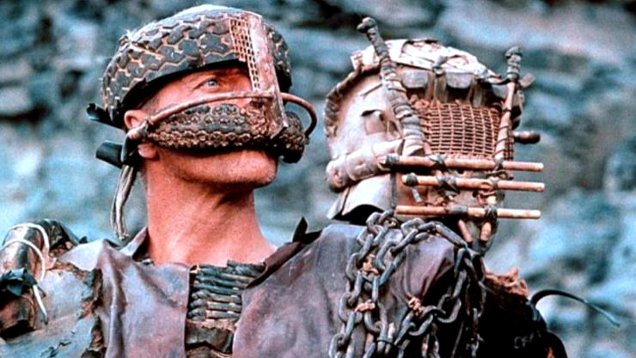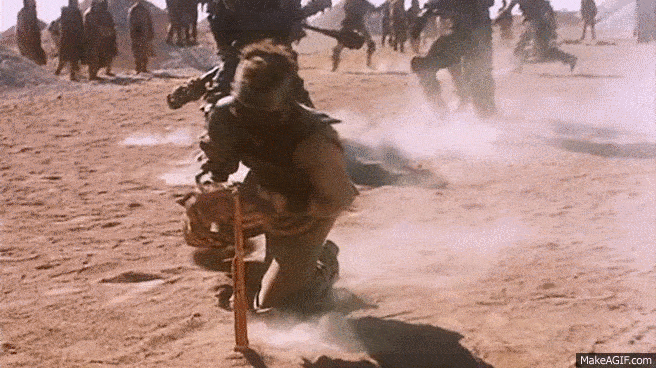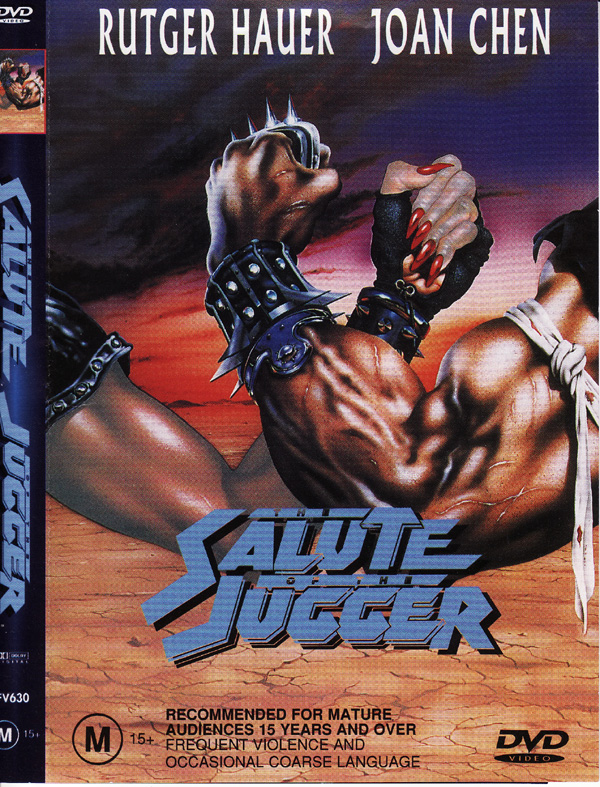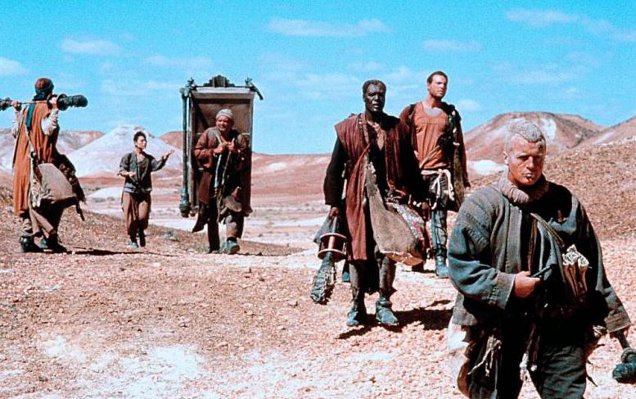30 years on, The Salute of the Jugger is still sci-fi’s best sports movie

The Juggers are coming! The cult classic dystopian film The Salute of the Jugger is now 30 years old. The critics never cared for it, but screw ’em. This lean, mean beast of a movie is still the best sci-fi sports film of all time, writes Travis Johnson.
“People no longer remembered the Golden Age of the 20th Century. They didn’t remember the miraculous technology or the cruel wars that followed. They didn’t remember when Juggers first played The Game or how it came to be played with a dog skull…”
There’s very little overlap between the circles in the Venn diagram labeled “Jocks and Nerds”, but the subgenre of science fiction sports movies surely lives in that thin sliver.
Not that there have been many: there’s Rollerball (1975 and, regrettably, 2002), of course; Futuresport (1998), Death Race 2000 (1975) and any number of gladiatorial grand slams from The Running Man to The Hunger Games. Even more conventional SF fare likes to step into the ring from time to time – consider the Phantom Menace’s pod racing sequence, or the recent Alita: Battle Angel’s Motorball.
However, the best of the bunch is 1989’s The Salute of the Jugger, celebrating its 30th anniversary this year. Certainly, some of the others have their charms (the original Rollerball, directed by Norman Jewison, is worth your time), but only The Salute of the Jugger has a one-eyed Rutger Hauer brutalizing dudes with a whopping great stick. Plus, its central game – or, as the film would have it, “The Game” – is played with a dog skull. That’s hardcore.
Set in some obscure corner of the post-apocalyptic wasteland, far from the petrochemical obsessions of the Mad Max films, The Salute of the Jugger (known elsewhere by the less evocative title, The Blood of Heroes) concerns a band of players (“Juggers” in the film’s parlance) led by Hauer’s gruff Sallow, who travel from town to town challenging local teams in “The Game”, a kind of hyper-violent rugby variation where the object is to put a dog’s skull on a spike in the opposing team’s end zone. Only one player on each team, the “quick”, can touch the skull – the rest are busting skulls with polearms and chains in attack and defence.

DogBoy (Justin Monjo) is too injured to keep playing and is replaced by Jedda (Joan Chen, making the first of three sci-fi movies with Hauer), a talented local player who wants to compete in The League. This is the professional games circuit run by the Nine Cities, the last vestiges of civilisation left in the wasteland.
It turns out Sallow used to be a League player, but got the boot when he had an affair with a noblewoman, and so is loathe to return. Of course, that doesn’t last for long, and the movie climaxes with Sallow’s team, which includes Delroy Lindo and Vincent D’Onofrio in full on Before They Were Famous mode, taking on a professional squad led by Gonzo (Max Fairchild), Sallow’s old teammate.
Sound good? Well, it didn’t to critics at the time. The film was a box office bomb, taking in less than $900k domestically. The critical fraternity absolutely savaged it. It currently sits on a 17% Rotten Tomatoes score, with Time’s critic lamenting, “There’s little to look at and nothing worth hearing. Even the game itself is a drag.” while The Washington Post’s Richard Carrington opined that it has “…about as much plot and depth as your average arcade game, but it’s never quite as involving.”
But screw those guys – they were wrong. The Salute of the Jugger found its audience via VHS, when a whole generation was enticed by its OTT cover depicting two muscular arms locked in the titular greeting, rendered in puffy, 3D plastic:

…and discovered inside a lean, muscular action movie that eschews melodrama and padding for sheer narrative drive, propelling our ragtag team from the bottom of the ladder to a championship bout at breakneck pace, just as any good sports flick should.
The Salute of the Jugger comes with a decent genre pedigree courtesy of writer/director David Webb Peoples. Seasoned cinema fans know Peoples for his writing, having put pen to paper on the likes of Unforgiven, 12 Monkeys, and, most famously, Blade Runner, but Jugger remains his only directorial effort. He filmed in Australia, around Coober Pedy in South Australia, a town no stranger to aftermath epics – parts of Mad Max: Beyond Thunderdome were filmed there.
That’s not the only Mad Max connection. Max Fairchild, who plays the scarred and hulking Gonzo, had small roles in Mad Max and Mad Max 2, while Hugh Keays-Byrne, who played the villains Toecutter in Mad Max and Immortan Joe in Fury Road, appears here as Lord Vile, an aristocrat of the Nine Cities who harbours a grudge against Sallow.

Not that being an aristo is much chop in the wasteland: while peasants might snack on dogs and frogs, in a banquet scene we see that goanna and insects passes for haute cuisine in the film’s harsh setting. This setting is realised effectively but cheaply, with dust-blown villages and the ornate, piecemeal armour the Juggers wear (crafted from bamboo, leather and old tires). The one city we get access to is a vast, subterranean warren of tunnels and chambers, oil-stained and halogen-lit. The world building is efficient but evocative, dropping us into the middle of things and expecting us to pick up the lingo and the context of the action.
And what action it is. Peoples was perhaps never going to be one of the great action auteurs – his over reliance on slow motion hints at a lack of confidence in staging fights – but the game sequences in Jugger are great fun: brutal, feral and kinetic. They also come at a cost, with the team’s manager/medic Gandhi (Gandhi McIntyre) sewing up his wounded warriors during their downtime. At one point, Chen bites off a guy’s ear; at another, Hauer loses an eye.
Ironically, The Salute of the Jugger itself has not remained unmaimed. It’s currently only widely available in a truncated US cut, which omits the film’s downbeat denouement, in which Sallow, having bested the city’s team, is nonetheless sent back to the wasteland, while his best players go onto the League, with the idea being that he’ll have to keep playing the shanty towns until he’s crippled or killed.
The film’s worth watching in any shape, but the full version adds a note of stoic melancholy that the American cut is lacking. These days, The Salute of the Jugger is unjustly obscure, although it does have a small but fervent fanbase, including Metal Gear creator Hideo Kojima, who bragposted about his Blu Ray score:
Bought The Salute of the Jugger BD that comes with the tote bag. pic.twitter.com/EOnum0SZKo
— HIDEO_KOJIMA (@HIDEO_KOJIMA_EN) January 13, 2017
Elsewhere in fandom there have been a few attempts to bring The Game to the gaming table, while real world Jugger leagues have sprung up around the globe. The film itself is tough to find – it doesn’t appear to be streaming anywhere in Australia, and disc availability is spotty at best. Its worth tracking down, though. Like its heroes, it’s a tough little battler of a film that takes the bit in its teeth and never quits, and easily one of the best post-apocalyptic flicks outside of the Rockatansky canon.
















